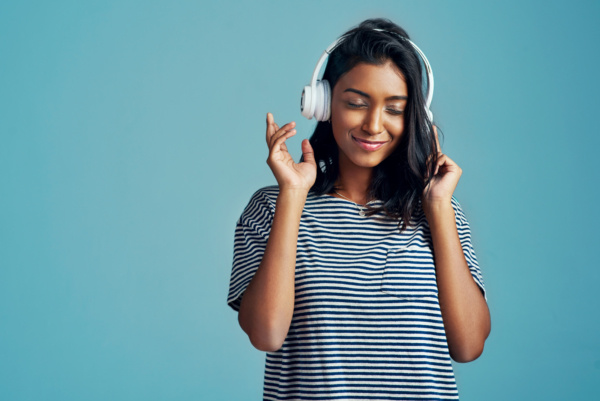By Geoff Waring

Photo used with permission from istockphoto.com.
Among the countless areas disrupted by the Covid-19 pandemic, music was certainly among those most affected. Bands and music groups could no longer meet to rehearse, live music was canceled for more than a year, and physical sales of albums saw sharp declines.
But for a group of hard-of-hearing cochlear implant users, the opportunity to create, discuss, and appreciate music played on. The “Cochlear Implant Music Hour,” a weekly session conceived of by Dr. Raymond Goldsworthy and the members of the Bionic Ear Lab at the USC Caruso Department of Otolaryngology-Head and Neck Surgery, was only able to meet in person for a single session before the pandemic forced them from the music room and onto online platforms like Zoom.
“I am amazed by how our community has come together to embrace and explore music appreciation and hearing loss during the pandemic,” says Dr. Goldsworthy. “The student and faculty support for this effort has been tremendous, and I am continually inspired by the courage and strength shown by our community members who are actively cultivating their music appreciation despite their hearing loss.”
Since then, the group has held over seventy sessions via Zoom, inviting guests and participants from around the country and, indeed, from all over the world. Recent guests have included Scottish percussionist Evelyn Glennie, audiologist and musician Dr. Brad Ingrao, neuroscientist Dr. David Eagleman, and vocalist Julie Fowlis.
Cochlear implants are small, complex electronic devices that help hard-of-hearing individuals experience a sense of sound. They are not hearing aids: instead of simply amplifying sound, they stimulate the auditory nerve directly, sending signals resembling sound to the brain. Cochlear implants use a speech processor to translate sounds into words. While they are excellent at deciphering language, they have more trouble picking up the subtle nuances of musical notes.
That doesn’t stop cochlear implant users from making, enjoying, and appreciating music—and that’s what the “Cochlear Implant Music Hour” is all about. Dr. Goldsworthy, who himself uses a cochlear implant and plays the guitar and tabla, conceived of the idea as a way to help cochlear implant users come together to support each other and learn new approaches to appreciating music.
In addition to allowing cochlear implant users to practice listening to musical scales, melodies, and instruments with other cochlear implant users, the sessions have evolved into a supportive environment where participants can discuss various matters related to music, music appreciation, research, and hearing loss. Each session allows participants to have an open discussion, asking questions and learning about new research in a friendly and understanding environment.
“I have a supportive family, but they don’t always know ways to help me,” says one regular music hour participant. “The once-a-year audiology appointment is not enough, so this is filling in the gaps.”
Continuing the program via Zoom during the pandemic has not been easy. Online sessions present a number of obstacles to music appreciation, including sound quality problems and the challenge of having musicians perform together (Zoom’s real-time lag makes playing music together from separate locations impossible). The upsides of continuing the sessions online, however, have far outweighed the challenges. Participants continue to show up each week, and have mentioned that in addition to teaching music appreciation, the Cochlear Implant Music Hour sessions have served as an important social venue to gather with like-minded individuals during an isolating and difficult time.
The Bionic Ear Lab plans to resume in-person music hours when it is safe and feasible to do so. In the meantime, they continue to meet to discuss all things music most Thursdays from 2-3pm. “We are always looking to expand our community and welcome anyone who thinks they may benefit from a community like this to join,” says Julianne Papadopoulos, a music student at the USC Thornton School of Music who, along with Community Music alumna Chrysa Kovach, has been organizing the sessions since August 2020. “We are also looking for more guest presenters who are members of the hearing loss community to join us. These guests, specifically, always serve as a great source of inspiration for our CI user community.”
In the meantime, for the cochlear implant users who continue to participate in the music hours every week, nothing—not hearing loss, nor long distance, nor even a pandemic—can stop the beat.
For more information about the weekly Cochlear Implant Music Hour program, please contact the USC Bionic Ear Lab at bionicear-L@usc.edu.